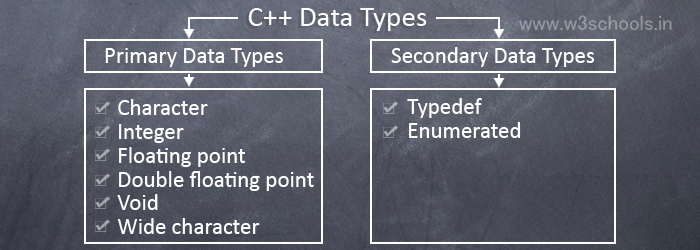Declaration & Assignments
C++ Data Types

Data types in any of the language means that what are the various type of data the variables can have in that particular language. Information is stored in a computer memory with different data types. Whenever a variable is declared it becomes necessary to define data type that what will be the type of data that variable can hold.
Data Types available in C++:
Both C and C++ compilers support the fundamental i.e. the built-in data types. Taking void as exception, the basic data types may have several modifiers, and these modifiers are used to serve the data types in various situations.
The lists of modifiers used in C++ are:
Character Data Types
| Data Type (Keywords) | Description | Size | Typical Range |
|---|---|---|---|
| char | Any single character. It may include a letter, a digit, a punctuation mark, or a space. | 1 byte | -128 to 127 or 0 to 255 |
| signed char | Signed character. | 1 byte | -128 to 127 |
| unsigned char | Unsigned character. | 1 byte | 0 to 255 |
| wchar_t | Wide character. | 2 or 4 bytes | 1 wide character |
Integer Data Types
| Data Type (Keywords) | Description | Size | Typical Range |
|---|---|---|---|
| int | Integer. | 4 bytes | -2147483648 to 2147483647 |
| signed int | Signed integer. Values may be negative, positive, or zero. | 4 bytes | -2147483648 to 2147483647 |
| unsigned int | Unsigned integer. Values are always positive or zero. Never negative. | 4 bytes | 0 to 4294967295 |
| short | Short integer. | 2 bytes | -32768 to 32767 |
| signed short | Signed short integer. Values may be negative, positive, or zero. | 2 bytes | -32768 to 32767 |
| unsigned short | Unsigned short integer. Values are always positive or zero. Never negative. | 2 bytes | 0 to 65535 |
| long | Long integer. | 4 bytes | -2147483648 to 2147483647 |
| signed long | Signed long integer. Values may be negative, positive, or zero. | 4 bytes | -2147483648 to 2147483647 |
| unsigned long | Unsigned long integer. Values are always positive or zero. Never negative. | 4 bytes | 0 to 4294967295 |
Floating-point Data Types
| Data Type (Keywords) | Description | Size | Typical Range |
|---|---|---|---|
| float | Floating point number. There is no fixed number of digits before or after the decimal point. | 4 bytes | +/- 3.4e +/- 38 (~7 digits) |
| double | Double precision floating point number. More accurate compared to float. | 8 bytes | +/- 1.7e +/- 308 (~15 digits) |
| long double | Long double precision floating point number. | 8 bytes | +/- 1.7e +/- 308 (~15 digits) |
Boolean Data Type
| Data Type (Keywords) | Description | Size | Typical Range |
|---|---|---|---|
| bool | Boolean value. It can only take one of two values: true or false. | 1 byte | true or false |
Variables sizes might be different in your PC from those shown in the above table, depending on the compiler you are using.
Below example will produce correct size of various data type, on your computer.
Example:
#include <iostream>
using namespace std;
int main() {
cout << "Size of char is " << sizeof(char) << endl;
cout << "Size of int is " << sizeof(int) << endl;
cout << "Size of float is " << sizeof(float) << endl;
cout << "Size of short int is " << sizeof(short int) << endl;
cout << "Size of long int is " << sizeof(long int) << endl;
cout << "Size of double is " << sizeof(double) << endl;
cout << "Size of wchar_t is " << sizeof(wchar_t) << endl;
return 0;
}Program Output:
Size of char is 1
Size of int is 4
Size of float is 4
Size of short int is 2
Size of long int is 4
Size of double is 8
Size of wchar_t is 4
Enum Data Type
This is an user defined data type having finite set of enumeration constants. The keyword ‘enum‘ is used to create enumerated data type.
Syntax:
enum enum-name {list of names}var-list;enum mca(software, internet, seo);Typedef
It is used to create new data type. But it is commonly used to change existing data type with another name.
Syntax:
typedef [data_type] synonym;typedef [data_type] new_data_type;Example:
typedef int integer;
integer rollno;
Comments
Post a Comment